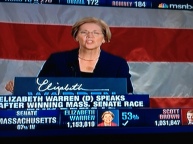Warren victory a high point by Marjorie Arons-Barron
The entry below is being cross-posted from Marjorie Arons-Barron’s own blog.
Massachusetts finally did it! It elected a woman to the U.S. Senate. And what a woman she is! After a miserable campaign start, in which she turned off even her supporters by appearing too prim, preachy, professorial and sometimes suffocatingly earnest, Elizabeth Warren finally got it. As the campaign moved away from her disappointing handling of the nettlesome issue of her Cherokee heritage, she became more sure of herself. She blossomed. Her affect brightened, and she projected warmth and authenticity.

Her intellect and creativity were never in question, nor was her commitment to ordinary people and fostering economic opportunity for the middle class. She was able to deal with Scott Brown’s occasionally bipartisan record by keeping the focus on what was at stake, Republican control of the Senate. Did voters really want Mitch McConnell to become Senate President or Oklahoma Senator James Inhofe, a climate change denier, to chair the committee on the environment? As the founder of the Consumer Financial Protection Bureau, her creds in financial services are impressive; Wall Street was probably not too happy when Warren was the victor in the race. (There’s a sweet irony to her going to the Senate which blocked her appointment to head the newly created bureau.)
Her ebullience last night was infectious. Her graciousness toward Brown was generous. Her promise to “break partisan gridlock” was strategic and effective as she told Brown’s supporters, “I know I didn’t earn your votes, but I’m going to work to earn your support.”
Brown was equally generous (“She won it fair and square. May she bring that Senate office great credit”), affable, ever the frat boy, broadly smiling as if the gathering of disappointed supporters were just another pretty darned terrific party. His most tantalizing remark was that “defeat is only temporary.” It seems clear that he will run for office again. The only question is whether it will be for U.S. Senate (if John Kerry replaces Hillary Clinton as Secretary of State, opening up his seat) or for Massachusetts governor. In a Senate special election, he would appear to be a prohibitive favorite, unless Deval Patrick got in the race. If Brown decided to wait to run for governor, would he go head-to-head with 2010 Republican nominee Charlie Baker or would Baker simply defer to Brown?
In the end, Brown’s good guy image (increasingly tarnished by negative campaign advertising, compounded by his venomous attacks on Warren during their televised debates) wasn’t enough to overcome the 20-point Obama margin in the state, but it could sustain him as he lays plans to run again, possibly as soon as next year.
Brown acquired instant national stature when he unexpectedly upended Martha Coakley to capture the seat long held by Ted Kennedy. Warren’s expertise in consumer and bankruptcy law, her determination in creating the consumer financial bureau, and her willingness to stand up to Wall St. had given her national stature even before she decided to run. Assuming she doesn’t limit her effectiveness by being reflexively partisan, she has the potential to be not just a star, but a real leader. She’s going to be very interesting to watch.
I welcome your comments in the section below.
Senator – elect Warren evolved as a candidate.